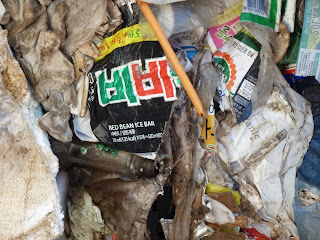Newly-Installed Barangay Officials Urgedto Go Zero Waste to Solve Garbage Woes
(Photo Courtesy by Dennis Sabangan/EPA)
A waste and pollution watchdog today
called on new barangay officials who will assume office starting tomorrow, 30
November, to take priority action to prevent and reduce waste generation and
disposal in their respective communities.
“We call upon all newly-installed barangay captains and councilors to work together in building garbage and toxic-free communities that are healthier and safer for our children to live in,” said Aileen Lucero, National Coordinator, EcoWaste Coalition.
“Please take to heart the much-needed waste prevention and reduction efforts to rid our communities of wastes and toxins, which could also pave by the way for greater mass participation on matters pertaining to public health, the environment and the climate,” she said.
“Such barangay-led initiatives can save lots of public funds and open up decent employment and livelihood opportunities from the reuse, repair, recycling and composting of waste resources,” she stated.
“Considering the dire impacts of extreme weather disturbances due to climate change, it will be essential for all barangays to integrate Zero Waste into their community disaster preparedness and resilience programs so that trash is prevented and properly managed at all times, including during post-disaster clearing operations” she added.
To start with, the new barangay councils should conduct a critical review of their ecological solid waste management programs, reconstitute their solid waste management committee if needed, set progressive goals and targets, and strategize on how to improve current performance, including maximizing the vital role of the informal waste sector.
The EcoWaste Coalition lamented that Republic Act 9003 despite being signed in 2000 remained to be inadequately enforced.
Also known as the Ecological Solid Waste Management Act, R.A. 9003 provides for a comprehensive and eco-friendly approach to managing discards mainly through waste prevention, reduction, segregation at source, reuse, recycling and composting, excluding waste incineration.
R.A. 9003 specifically requires the country’s over 42,000 barangays to develop ecological solid waste management programs, promote waste separation at source, enforce a segregated collection for biodegradable and non-biodegradable waste, and establish Materials Recovery Facilities (MRFs) in every barangay or cluster of barangays.
The MRFs, or Ecology Centers as they are also called, are essential in the ecological management of discards that would otherwise end up in storm drains and rivers aggravating flood problems, or get disposed of in dumpsites, landfills or incinerators resulting to the discharge of toxic leachate, greenhouse gases, persistent organic pollutants and other hazardous substances.
According to the website of the National Solid Waste Management Commission (NSWMC), there are only 9,611 MRFs nationwide serving 10,529 barangays, while 993 illegal dumpsites continue to operate.
As per data by the NSWMC, Metro Manila produces 8,400 to 8,600 tons of garbage daily, or about one fourth of the national daily waste generation of some 35,000 tons.
-end-
Reference:
http://www.chanrobles.com/republicactno9003.htm
“We call upon all newly-installed barangay captains and councilors to work together in building garbage and toxic-free communities that are healthier and safer for our children to live in,” said Aileen Lucero, National Coordinator, EcoWaste Coalition.
“Please take to heart the much-needed waste prevention and reduction efforts to rid our communities of wastes and toxins, which could also pave by the way for greater mass participation on matters pertaining to public health, the environment and the climate,” she said.
“Such barangay-led initiatives can save lots of public funds and open up decent employment and livelihood opportunities from the reuse, repair, recycling and composting of waste resources,” she stated.
“Considering the dire impacts of extreme weather disturbances due to climate change, it will be essential for all barangays to integrate Zero Waste into their community disaster preparedness and resilience programs so that trash is prevented and properly managed at all times, including during post-disaster clearing operations” she added.
To start with, the new barangay councils should conduct a critical review of their ecological solid waste management programs, reconstitute their solid waste management committee if needed, set progressive goals and targets, and strategize on how to improve current performance, including maximizing the vital role of the informal waste sector.
The EcoWaste Coalition lamented that Republic Act 9003 despite being signed in 2000 remained to be inadequately enforced.
Also known as the Ecological Solid Waste Management Act, R.A. 9003 provides for a comprehensive and eco-friendly approach to managing discards mainly through waste prevention, reduction, segregation at source, reuse, recycling and composting, excluding waste incineration.
R.A. 9003 specifically requires the country’s over 42,000 barangays to develop ecological solid waste management programs, promote waste separation at source, enforce a segregated collection for biodegradable and non-biodegradable waste, and establish Materials Recovery Facilities (MRFs) in every barangay or cluster of barangays.
The MRFs, or Ecology Centers as they are also called, are essential in the ecological management of discards that would otherwise end up in storm drains and rivers aggravating flood problems, or get disposed of in dumpsites, landfills or incinerators resulting to the discharge of toxic leachate, greenhouse gases, persistent organic pollutants and other hazardous substances.
According to the website of the National Solid Waste Management Commission (NSWMC), there are only 9,611 MRFs nationwide serving 10,529 barangays, while 993 illegal dumpsites continue to operate.
As per data by the NSWMC, Metro Manila produces 8,400 to 8,600 tons of garbage daily, or about one fourth of the national daily waste generation of some 35,000 tons.
-end-
Reference:
http://www.chanrobles.com/republicactno9003.htm





Comments